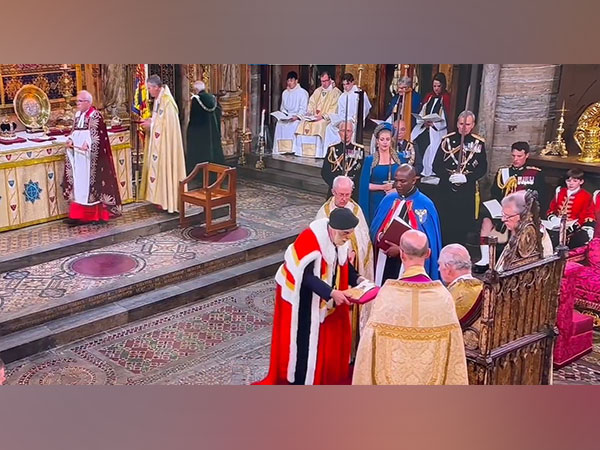British Sikh Lord Indarjit Singh presents Glove to King Charles III on Coronation
London [United Kingdom], May 6 (ANI): At the Coronation on Saturday, the Glove to hold the Sovereign’s Sceptre during the Crowning, was presented to King Charles III by Lord Indarjit Singh of Wimbledon.

The Glove is worn to hold the Sovereign’s Sceptre during the Crowning and then removed before processing to the Throne Chair, the Royal.UK wrote. The Coronation Glove or gauntlet is made for the Sovereign’s right hand. The King reused the Coronation Glove made for the Coronation of his grandfather, King George VI, in the interests of sustainability and efficiency. It was presented by the Worshipful Company of Glovers, made by Dents the glovemakers, and embroidered by Edward Stillwell and Company in 1937.
This Glove has been conserved by Dents with support from the Worshipful Company of Glovers and was re-presented by the Company ahead of the Coronation on 6th May, the Royal.UK wrote.
The Glove is made of white leather and the wrist is embroidered with gilt metal thread, wire and spangles in the form of national emblems including the Tudor Rose, thistle, shamrock, oak leaves and acorns. The back of the hand with an embroidered ducal coronet in red velvet above the coat of arms of the family of the Dukes of Newcastle. The wrist is lined with red satin.
The King reused historic items of clothing from the Royal Collection, worn by previous monarchs at past Coronations, during the Coronation Service at Westminster Abbey. The ‘vestments’ were worn as the King was crowned by the Archbishop of Canterbury in the Coronation Chair.
His Majesty reused vestments which featured in the Coronation Services of King George IV in 1821, King George V in 1911, King George VI in 1937 and Queen Elizabeth II in 1953, including the Colobium Sindonis, the Supertunica, the Imperial Mantle, the Coronation Sword Belt and the Coronation Glove, the Royal.UK wrote.
Although it is customary for the Supertunica and the Imperial Mantle to be reused, King Charles III also reused the Colobium Sindonis, Coronation Sword Belt and Coronation Glove worn by his grandfather King George VI, in the interests of sustainability and efficiency, the Royal.UK wrote.
Lord Indarjit Singh is a British Sikh peer. The House of Lords, also known as the House of Peers, is the upper house of the Parliament of the United Kingdom.
Lord Indarjit Singh represented the Sikh community at Queen Elizabeth II’s funeral, former Member of Parliament Tarlochan Singh said in the statement. He had also attended the wedding of the son of the then-Prince of Wales Charles.
King Charles III is also serving as the Head of the Church of England and all the ceremonies are conducted by the Archbishop. However, it is reported that King Charles expressed his desire to be a defender of all faiths while serving as head of the Christian faith in the UK.
It is for the first time that peers from different faiths – Muslim, Hindu, Sikh and Jewish were part of the procession during the coronation ceremony.
The Sikh community had hailed the decision of King Charles to give equal status to all religions, Tarlochan Singh said in the statement. The UK Government named 90-year-old Lord Indarjit Singh to represent the Sikh community.
Earlier this month, the UK’s royal family revealed new details, including a new Twitter emoji ahead of the coronation of King Charles III, which is scheduled to take place next month.
Taking to the official Twitter handle, the Royal Family said, “A special emoji for the Coronation has gone live today! The emoji, based on St Edward’s Crown, will appear when any of the following hashtags are used: #Coronation #CoronationConcert #TheBigHelpout #CoronationWeekend #CoronationBigLunch”.
On the morning of the Coronation, the Royals travelled from Buckingham Palace in The King’s Procession to Westminster Abbey in the Diamond Jubilee State Coach – which was created in 2012 for Queen Elizabeth II’s Diamond Jubilee.
The King’s Procession, accompanied by The Sovereign’s Escort of the Household Cavalry departed Buckingham Palace and proceeded down The Mall, passing through Admiralty Arch and Trafalgar Square, down Whitehall and along Parliament Street to Westminster Abbey.
The procession from Westminster Abbey to Buckingham Palace took the same route in reverse.
The procession included Armed Forces from across the Commonwealth and the British Overseas Territories, and all Services of the UK’s Armed Forces.
The members of the Royal family travelled in the Gold State Coach, which was commissioned in 1760 and was first used by King George III to travel to the State Opening of Parliament in 1762, and has been used at every Coronation since that of William IV in 1831.






